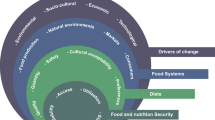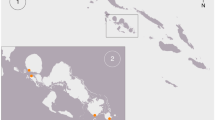Abstract
This study examined critical impacts of climate change on Inuit diet and nutritional health in four Inuit communities in the Inuvialuit Settlement Region, Western Arctic, Canada. The first objective was to combine data from community observation studies and dietary interview studies to determine potential climate change impacts on nutritional quality. The second objective was to address the scale of data collection and/or availability to compare local versus regional trends, and identify implications for adaptation planning. Information was compiled from 5 reports (4 community reports and 1 synthesis report) of climate change observations, impacts and adaptations in 12 Inuit communities (2005–2006), and from a dietary report of food use from 18 Inuit communities (1997–2000). Changing access to, availability of, quality of, and ability to use traditional food resources has implications for quality of diet. Nutritional implications of lower traditional food use include likely reductions in iron, zinc, protein, vitamin D, and omega-3 fatty acids, among others. The vulnerability of each community to changing food security is differentially influenced by a range of factors, including current harvesting trends, levels of reliance on individual species, opportunities for access to other traditional food species, and exposure to climate change hazards. Understanding linkages between climate change and traditional food security provides a basis for strengthening adaptive capacity and determining effective adaptation options to respond to future change.



Similar content being viewed by others
References
ACIA (2005) Arctic Climate Impact Assessment. Cambridge, UK: Cambridge University Press.
Berkes F, Jolly D (2001) Adapting to climate change: social-ecological resilience in a Canadian western Arctic community. Conservation Ecology 5:18.
Berti PR, Hamilton S, Receveur O, Kuhnlein H (1999) Food use and nutrient adequacy in Baffin Inuit children and adolescents. Canadian Journal of Dietetic Practice and Research 60:63-70.
Bjerregaard P, Jørgensen M (2008) Diet, nutrition, and physical activity. In: Health Transitions in Arctic Populations, Young TK, Bjerregaard P (editors), Toronto: University of Toronto Press, pp 192–204
Boult DA (2004) Hunger in the Arctic: Food (in)security in Inuit Communities. A Discussion Paper. Ottawa, ON: National Aboriginal Health Organization, Ajunnginiq Centre
Callaghan T, Johansson M, Björn LO, Chernov Y, Chapin T, Christensen TR, et al. (2004) Responses to projected changes in climate and UV-B at the species level. Ambio 33:418-435.
Cannon T (1995) Indigenous peoples and food entitlement losses under the impact of externally-influenced change. GeoJournal 35:137-150.
Chan HM, Fediuk K, Hamilton S, Rostas L, Caughey A, Kuhnlein H, et al. (2006) Food security in Nunavut, Canada: barriers and recommendations. International Journal of Circumpolar Health 65:416-430.
Community of Aklavik, Nickels S, Furgal C, Castleden J, Armstrong B, Buell M, et al. (2005) Unikkaaqatigiit—Putting the Human Face on Climate Change: Perspectives from Aklavik, Inuvialuit Settlement Region. Ottawa: Joint publication of Inuit Tapiriit Kanatami, Nasivvik Centre for Inuit Health and Changing Environments at Université Laval and the Ajunnginiq Centre at the National Aboriginal Health Organization
Community of Holman Island, Fonger R, Moss-Davies P (2005) Unikkaaqatigiit—Putting the Human Face on Climate Change: Perspectives from Holman Island, Inuvialuit Settlement Region. Ottawa: Joint publication of Inuit Tapiriit Kanatami, Nasivvik Centre for Inuit Health and Changing Environments at Université Laval and the Ajunnginiq Centre at the National Aboriginal Health Organization
Community of Paulatuk, Fonger R, Moss-Davies P (2005) Unikkaaqatigiit—Putting the Human Face on Climate Change: Perspectives from Paulatuk, Inuvialuit Settlement Region. Ottawa: Joint publication of Inuit Tapiriit Kanatami, Nasivvik Centre for Inuit Health and Changing Environments at Université Laval and the Ajunnginiq Centre at the National Aboriginal Health Organization
Community of Tuktoyaktuk, Nickels S, Furgal C, Castleden J, Armstrong B, Binder R, et al. (2005) Unikkaaqatigiit—Putting the Human Face on Climate Change: Perspectives from Tuktoyaktuk, Inuvialuit Settlement Region. Ottawa: Joint publication of Inuit Tapiriit Kanatami, Nasivvik Centre for Inuit Health and Changing Environments at Université Laval and the Ajunnginiq Centre at the National Aboriginal Health Organization
DFO (2000) Eastern Arctic Beaufort Sea beluga whales. www.dfo-mpo.gc.ca/csas/Csas/status/2000/E5-38e.pdf. Accessed 27 March 2009
FAO (1996) Rome declaration on world food security and World Food Summit plan of action www.fao.org/docrep/003/w3613e/w3613e00.htm. Accessed 10 Jan 2007
Ford JD (2009) Vulnerability of Inuit food systems to food insecurity as a consequence of climate change: a case study from Igloolik, Nunavut. Regional Environmental Change 9:83-100
Government of the Northwest Territories (2009) Muskox in the NWT www.enr.gov.nt.ca/_live/pages/wpPages/Muskox.aspx. Accessed 20 July 2009
Gregory PJ, Ingram JSI, Brklacich M (2005) Climate change and food security. Philosophical Transactions B 2139–2148
Guyot M, Dickson C, Paci C, Furgal C, Chan HM (2006) Local observations of climate change and impacts on traditional food security in two northern aboriginal communities. International Journal of Circumpolar Health 65:403-415
Health Canada (2007) Canadian nutrient file, 2007b version www.healthcanada.ca/cnf. Accessed 4 April 2009
Hinzman L, Bettez N, Bolton W, Chapin F, Dyurgerov M, Fastie C, et al. (2005) Evidence and Implications of recent climate change in northern Alaska and other Arctic regions. Climatic Change 72:251-298
IPCC (2007) Climate change 2007: Impacts, adaptation and vulnerability. In: Contribution of Working Group II to the Fourth Assessment Report of the Intergovernmental Panel on Climate Change, Parry M, Canziani O, Palutikof J, van der Linden P, Hanson C (editors), Cambridge, UK: Cambridge University Press, p 976
Joint Secretariat (2003) Inuvialuit harvest study: data and methods report 1988-1997. Inuvik, NT.
Kuhnlein H, Receveur O (2007) Local cultural animal food contributes high levels of nutrients for Arctic Canadian indigenous adults and children. Journal of Nutrition 137:1110-1114.
Kuhnlein H, Receveur O, Chan HM, Loring E (2000) Assessment of Dietary Benefit/Risk in Inuit Communities. Ste-Anne-de-Bellevue, QC: Centre for Indigenous Peoples’ Nutrition and Environment, Inuit Tapirisat of Canada
Kuhnlein H, Receveur O, Soueida R, Egeland G (2004) Arctic indigenous peoples experience the nutrition transition with changing dietary patterns and obesity. Journal of Nutrition 124:1447-1453.
Lambden J, Receveur O, Kuhnlein H (2007) Traditional food attributes must be included in studies of food security in the Canadian Arctic. International Journal of Circumpolar Health 66:308-319.
Lambden J, Receveur O, Marshall J, Kuhnlein H (2006) Traditional and market food access in Arctic Canada is affected by economic factors. International Journal of Circumpolar Health 65:331–340.
McIntyre L (2003) Food security: more than a determinant of health. Policy Options March:46–51
McIntyre L (2004) Food insecurity. In: Social Determinants of Health: Canadian Perspectives, Raphael D (editor), Toronto: Canadian Scholars’ Press Inc., pp 173–185
Nancarrow TL (2007) Climate change impacts on nutritional status of Inuit in Nunavut, Canada. MSc Thesis, McGill University, Montreal, QC
Nickels S, Furgal C, Buell M, Moquin H (2006) Unikkaaqatigiit—Putting the Human Face on Climate Change: Perspectives from Inuit in Canada. Ottawa, ON: Inuit Tapiriit Kanatami, Nasivvik Centre for Inuit Health and Changing Environments, Ajunnginiq Centre (NAHO)
Northwest Territories Bureau of Statistics (2007a) Aklavik—Statistical profile www.stats.gov.nt.ca/Profile/Profile.html. Accessed 7 Nov 2008
Northwest Territories Bureau of Statistics (2007b) Paulatuk—Statistical profile www.stats.gov.nt.ca/Profile/Profile.html. Accessed 7 Nov 2008
Northwest Territories Bureau of Statistics (2007c) Tuktoyaktuk—Statistical profile www.stats.gov.nt.ca/Profile/Profile.html. Accessed 7 Nov 2008
Northwest Territories Bureau of Statistics (2007d) Ulukhaktok (Holman)—Statistical profile www.stats.gov.nt.ca/Profile/Profile.html. Accessed 7 Nov 2008
Otten JJ, Pitzi Hellwig J, Myers LD (editors) (2006) Dietary Reference Intakes: The Essential Guide to Nutrient Requirements. Washington, D.C.: The National Academic Press
Paci C, Dickson C, Nickels S, Chan L, Furgal C (2004) Food security of northern indigenous peoples in a time of uncertainty. 3rd Northern Research Forum Open Meeting, Yellowknife, NWT
Public Health Agency of Canada (2004) Food security as a determinant of health www.phac-aspc.gc.ca/ph-sp/oi-ar/. Accessed 19 March 2009
Receveur O, Boulay M, Kuhnlein H (1997) Decreasing traditional food use affects diet quality for adult Dene/Métis in 16 communities of the Canadian Northwest Territories. Journal of Nutrition 127:2179-2186
Receveur O, Kassi N, Chan L, Berti PR, Kuhnlein H (1998) Yukon First Nations’ assessment of dietary benefit/risk. Ste-Anne-de-Bellevue, QC: Centre for Indigenous Peoples’ Nutrition and Environment
Tarasuk VS (2004) Health implications of food insecurity. In: Social Determinants of Health: Canadian Perspectives, Raphael D (editor), Toronto: Canadian Scholars’ Press Inc., pp 187–200
Wein EE, Freeman MMR (1995) Frequency of traditional food use by three Yukon First Nations living in four communities. Arctic 48:161-171
Willows ND (2005) Determinants of healthy eating in Aboriginal Peoples in Canada. Canadian Journal of Public Health 96:S32–S36
World Health Organization (2007) Food security. www.who.int/trade/glossary/story028/en/. Accessed 10 Jan 2007
Acknowledgments
We thank Crystal Lennie of the Inuvialuit Regional Corporation and the three anonymous reviewers for their helpful comments on an earlier version of this manuscript. We thank Ms. Tamara Charlie for her help in aggregating the data. Funding was provided by the Natural Sciences and Engineering Council of Canada through ArcticNet and the International Polar Year Program.
Author information
Authors and Affiliations
Corresponding author
Rights and permissions
About this article
Cite this article
Wesche, S.D., Chan, H.M. Adapting to the Impacts of Climate Change on Food Security among Inuit in the Western Canadian Arctic. EcoHealth 7, 361–373 (2010). https://doi.org/10.1007/s10393-010-0344-8
Received:
Revised:
Accepted:
Published:
Issue Date:
DOI: https://doi.org/10.1007/s10393-010-0344-8




